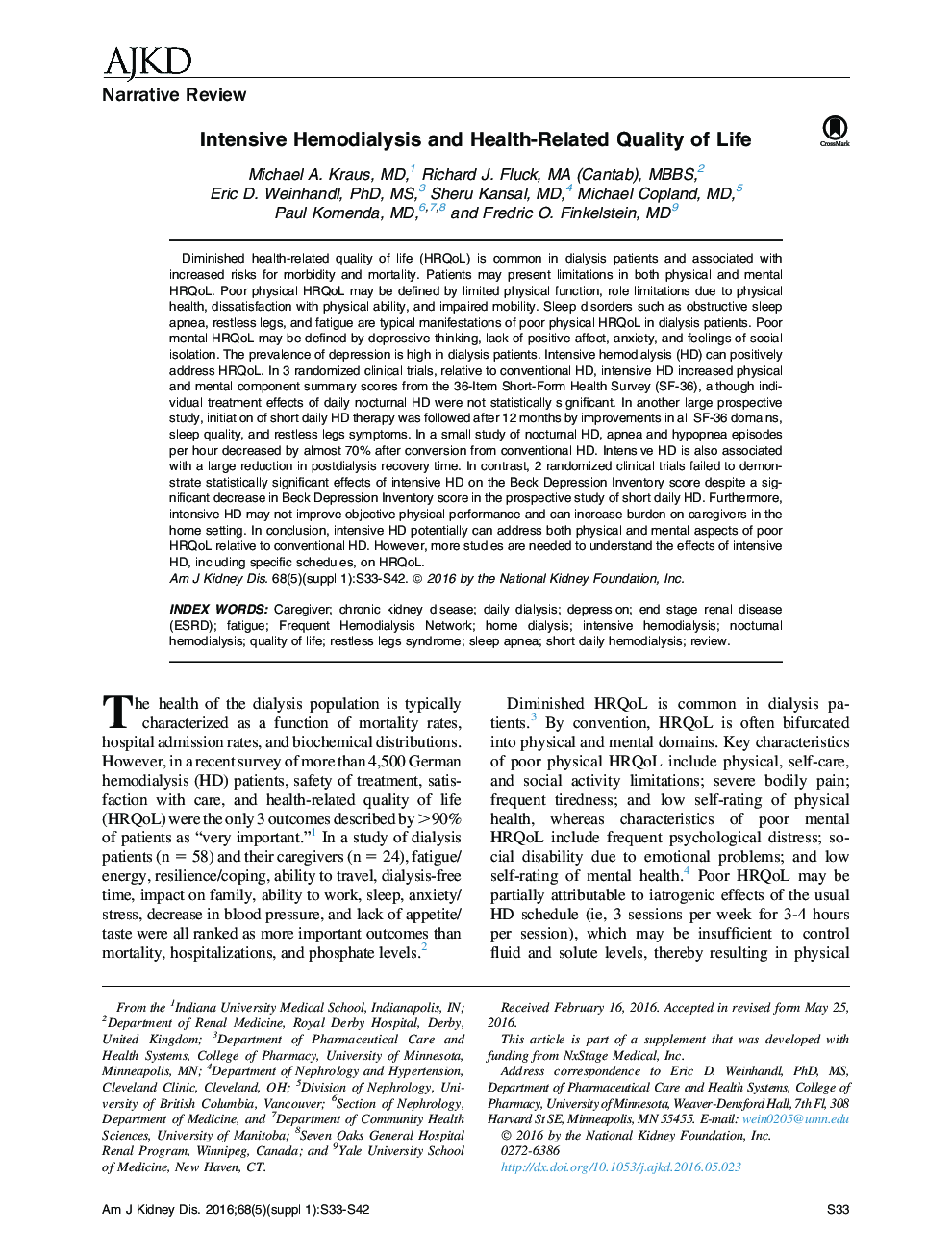| کد مقاله | کد نشریه | سال انتشار | مقاله انگلیسی | نسخه تمام متن |
|---|---|---|---|---|
| 5685873 | 1598235 | 2016 | 10 صفحه PDF | دانلود رایگان |
عنوان انگلیسی مقاله ISI
Intensive Hemodialysis and Health-Related Quality of Life
ترجمه فارسی عنوان
همودیالیز شدید و کیفیت زندگی مرتبط با سلامت
دانلود مقاله + سفارش ترجمه
دانلود مقاله ISI انگلیسی
رایگان برای ایرانیان
کلمات کلیدی
Quality of life - کیفیت زندگیSleep apnea - آپنه خوابDepression - افسردگیchronic kidney disease - بیماری مزمن کلیویFatigue - خستگیHome dialysis - دیالیز اصلیDaily dialysis - دیالیز روزانهrestless legs syndrome - سندرم پای بی قرارFrequent Hemodialysis Network - شبکه همودیالیز مکررCaregiver - مراقبend stage renal disease (ESRD) - مرحله نهایی بیماری کلیوی (ESRD)Review - مرورshort daily hemodialysis - همودیالیز روزانه کوتاهnocturnal hemodialysis - همودیالیز شبانهIntensive hemodialysis - همودیالیز شدید
موضوعات مرتبط
علوم پزشکی و سلامت
پزشکی و دندانپزشکی
بیماریهای کلیوی
چکیده انگلیسی
Diminished health-related quality of life (HRQoL) is common in dialysis patients and associated with increased risks for morbidity and mortality. Patients may present limitations in both physical and mental HRQoL. Poor physical HRQoL may be defined by limited physical function, role limitations due to physical health, dissatisfaction with physical ability, and impaired mobility. Sleep disorders such as obstructive sleep apnea, restless legs, and fatigue are typical manifestations of poor physical HRQoL in dialysis patients. Poor mental HRQoL may be defined by depressive thinking, lack of positive affect, anxiety, and feelings of social isolation. The prevalence of depression is high in dialysis patients. Intensive hemodialysis (HD) can positively address HRQoL. In 3 randomized clinical trials, relative to conventional HD, intensive HD increased physical and mental component summary scores from the 36-Item Short-Form Health Survey (SF-36), although individual treatment effects of daily nocturnal HD were not statistically significant. In another large prospective study, initiation of short daily HD therapy was followed after 12 months by improvements in all SF-36 domains, sleep quality, and restless legs symptoms. In a small study of nocturnal HD, apnea and hypopnea episodes per hour decreased by almost 70% after conversion from conventional HD. Intensive HD is also associated with a large reduction in postdialysis recovery time. In contrast, 2 randomized clinical trials failed to demonstrate statistically significant effects of intensive HD on the Beck Depression Inventory score despite a significant decrease in Beck Depression Inventory score in the prospective study of short daily HD. Furthermore, intensive HD may not improve objective physical performance and can increase burden on caregivers in the home setting. In conclusion, intensive HD potentially can address both physical and mental aspects of poor HRQoL relative to conventional HD. However, more studies are needed to understand the effects of intensive HD, including specific schedules, on HRQoL.
ناشر
Database: Elsevier - ScienceDirect (ساینس دایرکت)
Journal: American Journal of Kidney Diseases - Volume 68, Issue 5, Supplement 1, November 2016, Pages S33-S42
Journal: American Journal of Kidney Diseases - Volume 68, Issue 5, Supplement 1, November 2016, Pages S33-S42
نویسندگان
Michael A. MD, Richard J. MA (Cantab), MBBS, Eric D. PhD, MS, Sheru MD, Michael MD, Paul MD, Fredric O. MD,
